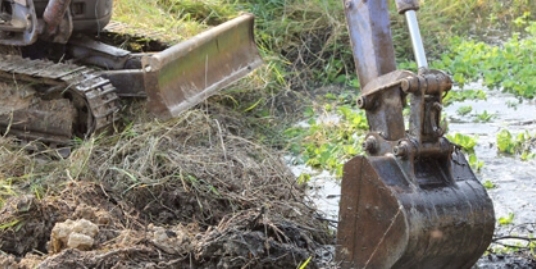
We’re here to distinguish the facts from the fiction regarding Japanese knotweed and knotweed treatments. There is one issue in particular that we’ll be addressing, however. There has been a spike of literature circling online promoting the message that the only acceptable way to treat your knotweed is to have it excavated. So, when should you use excavation to remove knotweed?
For people who aren’t familiar with Japanese knotweed and its treatment, excavation might seem like the obvious path. When you have weeds in your garden you dig them out, right?Well, with knotweed, that isn’t always the case.
Japanese Knotweed Excavation
One of the features that makes knotweed such a menace is the rate at which it grows due to its expansive root system. The root system of Japanese knotweed can grow up to 2 metres deep and 7 metres horizontally from the visible part of the plant. For those with extensive knotweed on their property, excavation can be an incredibly costly and time-consuming process.
There’s a narrative surrounding knotweed that implies that herbicide treatments aren’t as effective as excavation, and that simply isn’t the case. Knotweed herbicide treatments are incredibly effective, and are in no way a ‘lesser’ treatment than excavation.
When is knotweed excavation necessary?
All of these contradictions can make it difficult to determine exactly when knotweed excavation should be used. Below are some of the scenarios in which you may actually need to use excavation as a knotweed treatment option.
1. When herbicide treatments are not viable
There are a number of instances in which herbicide treatments may not be viable. For example, if the knotweed is in close proximity to a used water source, or on arable land that is being used for agricultural purposes. If you’re not sure whether or not your land is suitable for herbicide treatments, it is always best to get a professional opinion.
2. When you want to develop on the land
Due to the extensive root systems, knotweed can cause the ground around it to become unstable. Whilst it can be possible to build on small amounts of knotweed that are being treated, it’s likely that excavation will be required to ensure the structural integrity of the buildings.
* * *
If you want to find out more information about the specifics of different knotweed treatments, you can check out our informational webpage.
If you’re not sure which knotweed treatment is right for you, you’re more than welcome to reach out and contact us today. One of our team members will be more than happy to answer any questions you may have.
We can also offer a FREE, no-obligation survey where one of our trained professionals will assess your property. Following the assessment, they will then issue a basic report stating whether or not knotweed is present and recommend a treatment plan best suited for your property, along with a quote for our services.
Contact Us
Read More: Can Japanese Knotweed Be Completely Eradicated?
